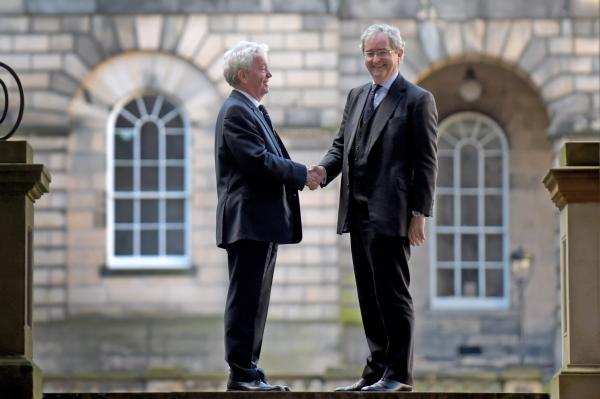
Ambitious plans to transform the University of Edinburgh's campuses will be boosted by a £200million loan from the EIB.
The loan, together with £100m from a US investment fund, will provide £300m of new investment capacity to support a range of building and refurbishment projects over the next 10 years. The investment will strengthen Edinburgh's reputation as a global leader in education and research.
The loan agreement, to be signed by Edinburgh Principal Professor Sir Timothy O'Shea and EIB Vice President Jonathan Taylor, will allow the University to step up its £1.5billion building programme.
Projects in the 10-year plan include a new home for the School of Biological Sciences, the creation of a Data Technology Institute – part of the Alan Turing Institute – and a refurbishment of the historic School of Law at Old College.
The plan also includes a redevelopment of the landmark McEwan Hall – transforming the iconic home of University graduation ceremonies into a combined ceremonial and conferencing facility.
As well as securing the EIB loan, the University has raised a further £100m of funding through a self-arranged private placement with the assistance and advice of professional advisers Ernst and Young.
Both deals have seen the University secure funding for up to 30 years at historically low levels, with a flexible repayment schedule and an average cost of borrowing of less than three per cent.
The remaining £1.2bn of the funding for the programme will be raised through capital grants, historic and new fundraising and annual surpluses for investment generated by the University.
This will be achieved while the university maintains robust, financially sustainable academic activities and its place in the global ranking of top universities.
Professor O’Shea said the excellent rates and flexible terms offered by the EIB reflect the bank's eagerness to support the infrastructure identified as crucial in maintaining and building on the University’s ambition and success. He added that the agreement also underlines the EIB’s view of the University of Edinburgh as a strong and reliable long-term credit partner.
In 2012, the bank provided the University with a £50m loan to support projects that included the creation of the Edinburgh Centre for Carbon Innovation, a refurbishment of the Main Library and the installation of the latest energy efficient combined heat and power network. The University has enjoyed excellent relations with the EIB team which made the current transaction run smoothly.
The EIB is directly owned by the 28 European Union member states, including a 16 per cent share held by the UK government. It has supported long-term investment in Scotland since 1974.
Lending by the EIB last year totalled £5.6bn and represented the largest annual engagement since the start of EIB lending in the UK in 1973. This supported nearly £16bn of overall investment in 40 projects across the UK, which schools, university campuses, hospitals, upgraded energy links, renewable energy projects and water infrastructure.
Professor O’Shea said: “We are very pleased that the EIB has the confidence in us to make a commitment that equals its largest loan to date in the UK. This will be critical in helping to create employment and economic growth. The University’s investment programme reflects its global ambition for growth in teaching, research and the transfer of knowledge. In addition being one of the world’s top 25 universities, the University of Edinburgh is a very major contributor to economic development in South East Scotland.”
Mr Taylor said: “The European Investment Bank recognises the ambitious development plans that will strengthen world class research, teaching facilities and student life at the University of Edinburgh over the next decade. This new £200m 30-year loan to the University of Edinburgh represents one of the largest ever loans to a European University, and reflects both the quality of the campus development plan, and the European Investment Bank’s clear commitment to support long-term investment in Scotland.”

Photographer: EIB ©The University of Edinburgh
Download original

Photographer: EIB ©The University of Edinburgh
Download original

Photographer: EIB ©The University of Edinburgh
Download original

Photographer: EIB ©The University of Edinburgh
Download original

Photographer: EIB ©The University of Edinburgh
Download original

Photographer: EIB ©The University of Edinburgh
Download original